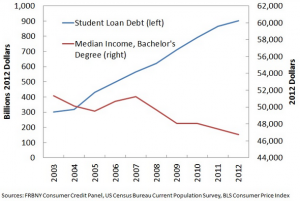Saving the Lost Art of Conversation
Dr Shelley Turkle, author of Alone Together, is writing a new book called Reclaiming Conversation.
The conclusion she’s arrived at while researching her new book is not, technically, that we’re not talking to each other. We’re talking all the time, in person as well as in texts, in e-mails, over the phone, on Facebook and Twitter. The world is more talkative now, in many ways, than it’s ever been. The problem, Turkle argues, is that all of this talk can come at the expense of conversation. We’re talking at each other rather than with each other.
She says that real conversations are messy, awkward, dull, boring, and full of pauses – just the kind of communication e-conversations are not where constant showmanship and excitement is the only way to get and sustain attention. She wants us to reclaim the permission to be, when we want and need to be, dull.
She advocates limiting our device usage in “sacred spaces” like the dinner table, the places where phones and their enticements may impede intimacy and interaction. She wants us to look into each other’s eyes as we talk. She wants us to read each other’s movements. She wants us to have conversations that are supremely human.
If Christians lose this art, we lose the ability to witness. But if Christians could reclaim and excel at this in a culture where it’s getting rarer, we have a huge opportunity for doing good to others and advancing the Gospel
Year of the Sinner
There’s been a bit of an outcry over Pope Francis’s reply to the question: “Who are you?” ”I am a sinner,” he said, “This is the most accurate definition. It is not a figure of speech, a literary genre. I am a sinner.”
That’s not gone down too well with some people who want to believe in Papal perfection. They yearn for a perfect man. Others, like the Huffington Post’s Rea Martin, wrote:
Sure we all sin to varying degrees and frequencies, depending on our definitions of sin…But while this is true, sort of, a sinner is not who I am, or for that matter, who he is. Or anyone.
In fact identifying ourselves as sinners is unhealthy, and when you think about it, has gotten us absolutely nowhere in the last few millennia or so, except into a lot of trouble.
It’s amazing how desperate people are to resist being identified as a sinner. “I sin, but I’m not a sinner.” I remember an old pastor who visited prisoners on death row, saying: “I met many men there who said, ‘Yes, I committed murder, but I’m not a murderer!” The Bible’s teaching is, “I murder because I’m a murderer. I sin because I’m a sinner.”
Also, as for confessing sin being unhealthy and getting us into a lot of trouble, the wisest man that ever lived said, “He who covers his sins will not prosper, but whoever confesses and forsakes them will have mercy” (Prov. 28:13).
Why Has Republican Belief in Evolution Declined So Much?
48% of Republicans believe in creation, a 9% increase in the last 4 years. The number of Democrats who believe in creation has declined a little to 27%.
Statisticians are struggling to explain the drop in Republican support for evolution. Some think that scientists are leaving the Republican party due to its perceived anti-science stance.
Another possibility is the rise of “intelligent design” education has helped to swing younger Americans against evolution.
Interestingly, and worryingly, respondents ages 18 to 29 most likely to believe in evolution. Maybe that’s explained by the educational indoctrination that takes a decade or more to fade.
Peter Thiel’s Graph of the Year
Alex Chediak sent me this stunning graph on the cost of a bachelor’s degree versus student loan debt.
 If you want a job rather than a debt, Codeacademy’s Zach Sim says you might want to learn how to code. He goes on:
If you want a job rather than a debt, Codeacademy’s Zach Sim says you might want to learn how to code. He goes on:
We’re lying to ourselves about [a four-year] college being the only form of postsecondary education. People who end up at vocational schools and associate degree programs might be making the right educational decisions.